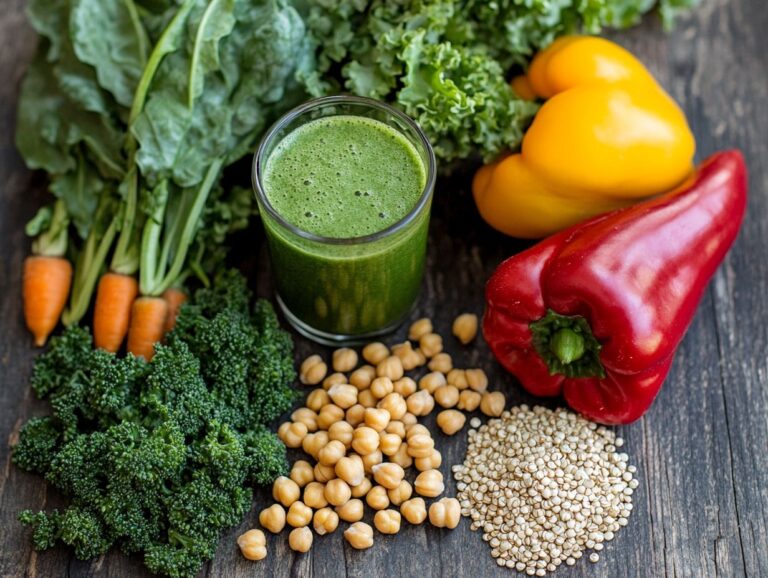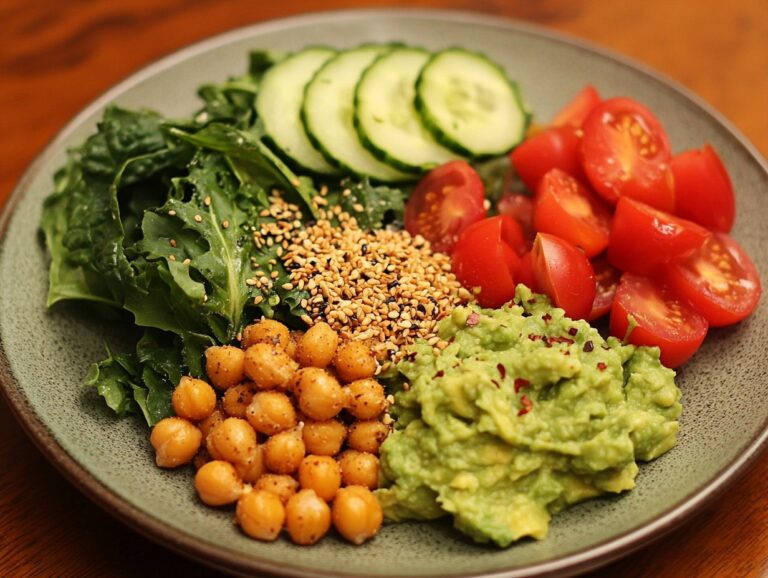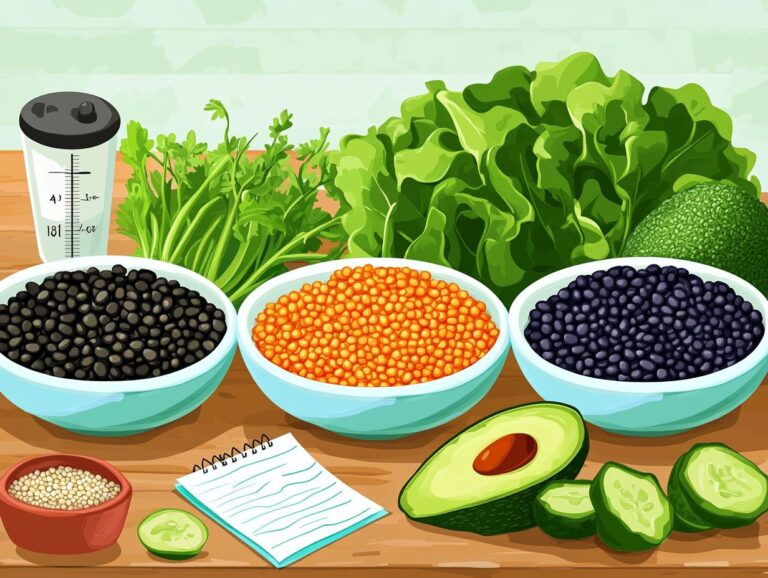Eczema is a frustrating and uncomfortable skin condition that can impact not only the skin but also the overall quality of life. Due to its various causes and triggers, many individuals are exploring dietary modifications, particularly the potential benefits of changing your diet to a vegan or plant-based diet. This article will examine what eczema is and its relationship with diet, including how adopting a vegan lifestyle may help alleviate eczema outbreaks and flare-ups. We will discuss important foods to include in your diet, foods to avoid, as well as natural remedies, an Ayurvedic diet, and vegan-friendly skincare options that can support skin health.
Key Takeaways:
1. A vegan diet can help with eczema by reducing inflammation and improving gut health through its anti-inflammatory properties.
2. Adding probiotics, omega-3 fatty acids, coconut oil, and aloe vera to your vegan diet can provide natural relief for eczema.
3. Vegan-friendly skincare products like oatmeal-based products, natural oils, and non-irritating cleansers can also help alleviate eczema symptoms.
What Is Eczema?
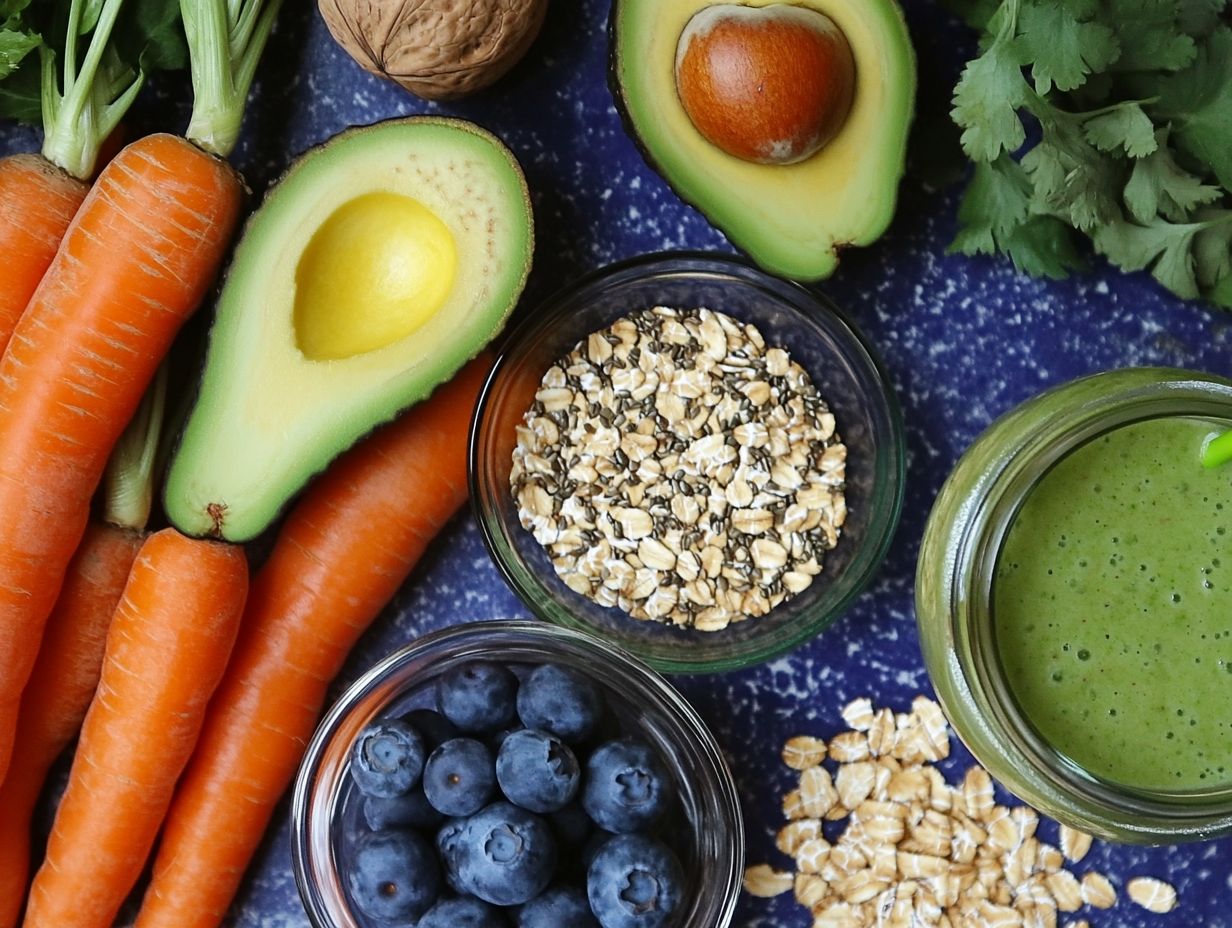
Eczema, also known as atopic dermatitis, is a chronic inflammatory skin condition characterized by dry, itchy skin, which can lead to discomfort and severe flare-ups. This common condition can significantly affect daily life.
This common skin disorder affects millions of people and has numerous triggers that can exacerbate its symptoms, including allergens, stress, and irritants, as well as related chronic health conditions like asthma and fibromyalgia.
Experts, such as Dr. Saadia Hussain, MD, from the Cleveland Clinic, emphasize the importance of understanding eczema in relation to its underlying connection to the immune system, food allergies, and the external factors that influence flare-ups.
What Causes Eczema?
Eczema is caused by a complex interplay of genetic, environmental, and immunological factors that contribute to its onset and persistence.
Factors such as food allergies, allergens, and exposure to irritants can trigger flare-ups, worsening the condition by initiating systemic contact dermatitis or allergic contact dermatitis. Additionally, chronic health conditions like asthma and elevated cholesterol, along with various environmental factors, play significant roles in the inflammation and irritation associated with atopic dermatitis.
Is Eczema Linked to Diet?
Emerging evidence suggests a strong association between eczema and diet, with certain food allergies potentially triggering or exacerbating eczema symptoms.
Specific dietary patterns, such as the Mediterranean diet, an elimination diet, and a plant-based diet rich in anti-inflammatory foods, may play a significant role in effectively managing eczema symptoms.
This relationship has led to a growing interest in exploring how diet can help alleviate symptoms associated with eczema flare-ups. Certain foods, including dairy, eggs, nuts, and gluten, have been identified as common allergens that can provoke reactions in susceptible individuals, resulting in increased inflammation and discomfort for those with eczema.
Many people have reported visible improvements in their eczema condition by eliminating these triggers from their diet. Conversely, a diet high in omega-3 fatty acids, found in fatty fish, flaxseeds, and walnuts, along with fruits and vegetables rich in antioxidants, may support skin health and help reduce symptoms linked to atopic dermatitis or eczema flare-ups.
How Can a Vegan Diet Help with Eczema?
A vegan diet can be beneficial for individuals suffering from eczema due to the anti-inflammatory properties of plant-based foods, which can also benefit other inflammatory skin conditions.
Incorporating a high amount of fruits, vegetables, whole grains, and legumes into a vegan diet can help combat inflammation and enhance skin health, potentially acting as a treatment for chronic GI issues and improving vitamin D levels. As a result, this dietary approach may serve as an effective treatment for eczema and potentially other chronic health conditions as well.
What Foods Should Be Included in a Vegan Diet for Eczema?
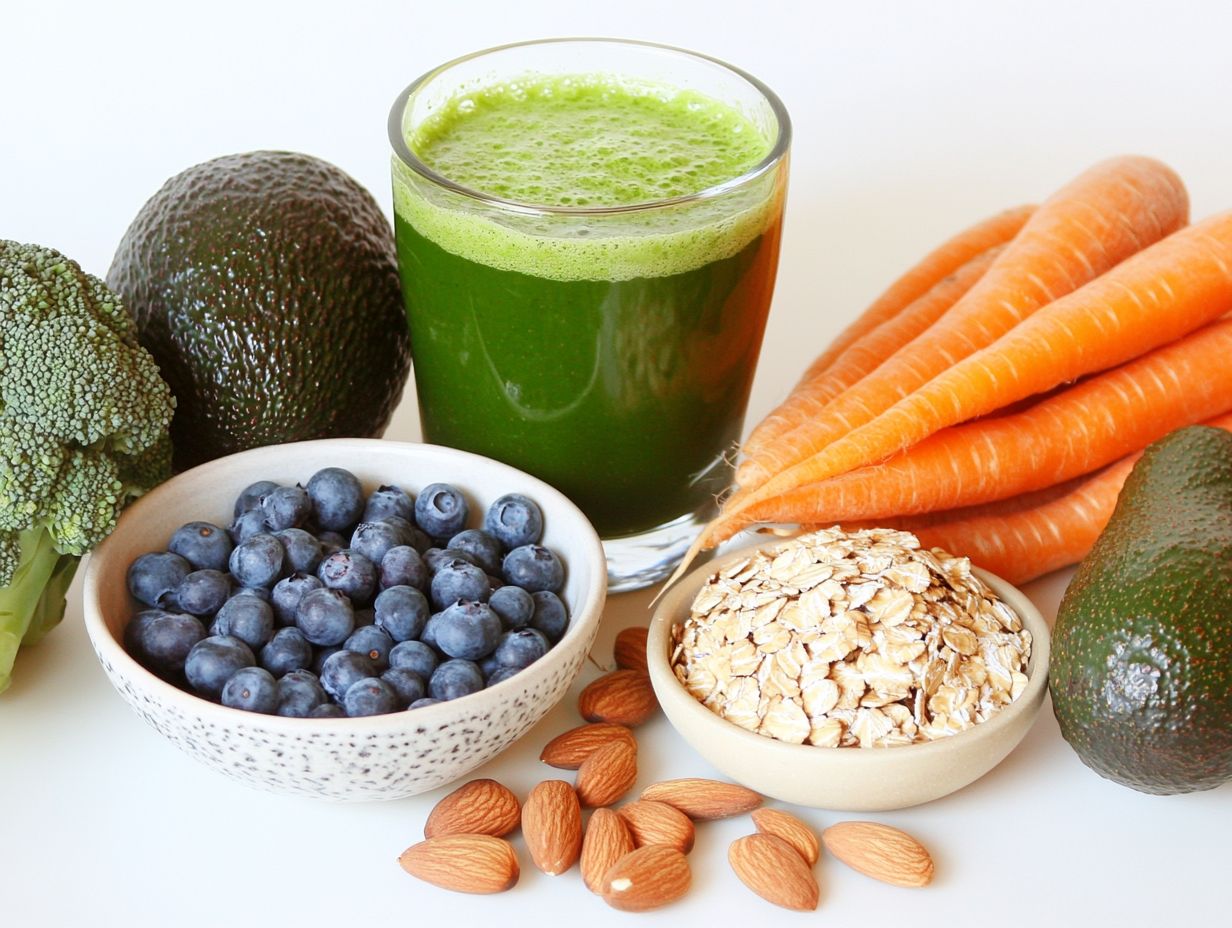
A vegan diet for eczema should include foods that are rich in nutrients to support skin health and reduce inflammation. Incorporating ingredients like turmeric and ginger, which possess anti-inflammatory properties, along with healthy fats from avocados and nuts, can significantly enhance overall skin health and help alleviate eczema symptoms.
Turmeric and ginger can be added to a variety of dishes to enhance flavor while providing their anti-inflammatory benefits. Avocados are rich in healthy fats and vitamins, particularly vitamin E, which is essential for maintaining healthy skin. Nuts and seeds, such as:
- Walnuts
- Chia seeds
- Flaxseeds
are excellent sources of omega-3 fatty acids and antioxidants that promote skin health.
Leafy greens, including:
- Spinach
- Kale
- Swiss chard
are packed with vitamins and minerals. They also offer hydration and anti-inflammatory properties that can help alleviate eczema symptoms. Berries, such as:
- Blueberries
- Strawberries
- Raspberries
are rich in vitamins and antioxidants that combat oxidative stress, contributing to improved skin health through their anti-inflammatory effects.
Sweet potatoes are another great choice, as they are a rich source of beta-carotene, which has antioxidant properties that can enhance skin health. Whole grains like:
- Brown rice
- Quinoa
- Whole barley
provide fiber, which aids digestion and supports a healthy gut. Recent studies suggest that a healthy gut is linked to improved skin health, potentially alleviating eczema symptoms.
Finally, lentils and legumes are excellent sources of plant-based protein, iron, and zinc—nutrients that play crucial roles in maintaining skin health and controlling inflammatory skin conditions. By including a variety of these foods in a vegan diet, individuals can create a balanced and nutritious meal plan that may improve their ability to manage eczema symptoms.
What Foods Should Be Avoided in a Vegan Diet for Eczema?
Foods that can worsen eczema in vegans include common allergens such as gluten and those high in dietary nickel, which can lead to systemic nickel allergy syndrome. Individuals with systemic nickel allergy syndrome should minimize or eliminate these foods, as a low nickel diet may help reduce eczema and food allergy-related symptoms.
Legumes are another food group that may trigger sensitivity in those predisposed to eczema. While soy products serve as a primary source of protein in vegan diets, they may not be suitable for everyone and can potentially cause skin irritation.
Nightshade vegetables, such as tomatoes, potatoes, and eggplants, are known to increase inflammation and should be limited for those who are sensitive to them, especially those with systemic contact dermatitis. Additionally, dairy alternatives made from nuts can pose a risk for individuals with nut allergies. Being aware of these foods can help individuals better manage their skin health.
What Are Other Natural Remedies for Eczema?
Natural remedies, including probiotics, omega-3 fatty acids, and holistic lifestyle practices, can complement dietary changes in managing eczema, controlling this common condition, and promoting healthier skin.
These remedies help strengthen the immune system and reduce inflammation, potentially leading to fewer eczema outbreaks and enhanced skin health.
1. Probiotics
Probiotics play a crucial role in gut health and have a direct impact on eczema and other inflammatory skin conditions. They enhance the immune system and help balance gut bacteria, which can lead to reduced inflammation, improved skin barrier function, and a subsequent decrease in both the incidence and severity of eczema outbreaks.
Along with direct supplementation, probiotics are present in fermented foods such as yogurt, kefir, sauerkraut, and kimchi, which can work synergistically to support the gut microbiome.
Studies have indicated that individuals with eczema often experience an imbalance in their gut bacteria; therefore, consuming a variety of probiotics may aid in restoring that balance. Regular consumption of these foods can not only help restore healthy gut function but also promote a robust immune response.
Specific strains, such as Lactobacillus rhamnosus and Bifidobacterium bifidum, have been shown to reduce the severity of eczema symptoms, underscoring the important connection between gut function and healthy skin.
2. Omega-3 Fatty Acids
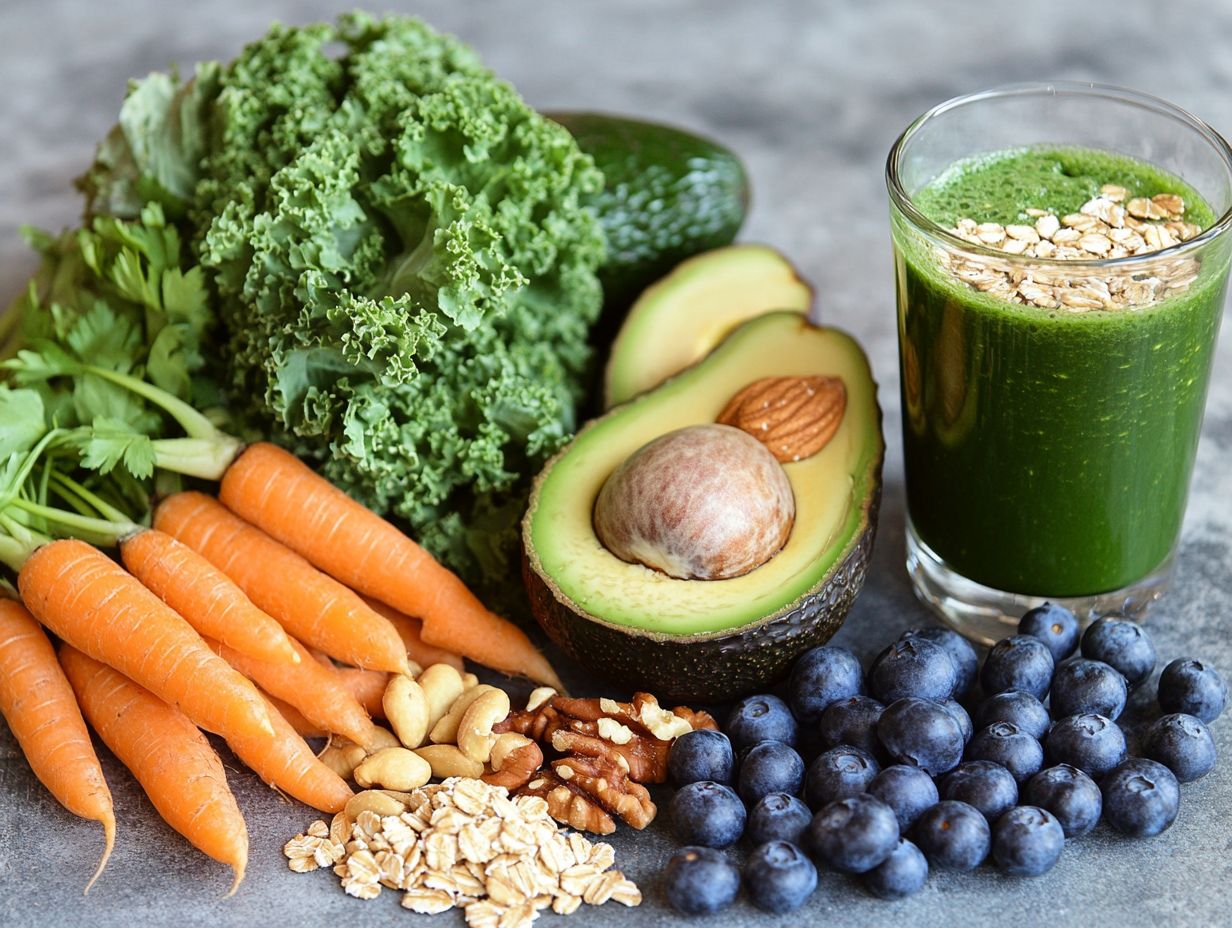
Omega-3 fatty acids are essential anti-inflammatory nutrients that can help support individuals with eczema. These beneficial fats are found in foods such as flaxseeds, walnuts, algae, and various other healthy options.
Omega-3s work by reducing skin inflammation and increasing hydration levels, which in turn improves skin health in those affected by eczema, especially when skin becomes dry. They may also alleviate dryness and itchiness commonly experienced by eczema sufferers. Omega-3 supplements, such as fish oil, can enhance skin elasticity and strength.
Along with promoting overall skin health, these fatty acids strengthen the skin barrier, which is crucial for individuals with eczema. Furthermore, omega-3s are believed to have anti-inflammatory effects that may help reduce the frequency and severity of eczema flare-ups.
3. Coconut Oil
Coconut oil is an effective natural remedy for eczema, as it helps to moisturize the skin, strengthening the skin barrier and preventing dehydration. Its unique properties reduce itching and irritation, making it a valuable topical treatment for managing eczema symptoms.
Along with providing hydration, coconut oil contains lauric acid, which has antimicrobial properties that help prevent infections in damaged skin. Regular use of this oil promotes softer and more supple skin, helping to prevent flare-ups commonly associated with eczema and systemic nickel allergy syndrome.
Many users have reported significant benefits from coconut oil, often applying it as a moisturizer after bathing or incorporating it into creams and lotions.
A study published in the Journal of Dermatological Treatment demonstrated that coconut oil was effective in reducing inflammation, suggesting it can serve as an adjunct therapy for individuals who do not respond well to conventional treatments or have systemic contact dermatitis.
4. Aloe Vera
Aloe vera is a widely recognized soothing agent and one of the most popular natural remedies for alleviating eczema, as it helps reduce itching and protect the skin. Its gel-like consistency is believed to hydrate the skin, enhance overall skin health, and diminish inflammation associated with eczema.
The anti-inflammatory properties of aloe vera are attributed to its antioxidants, vitamins, and anti-inflammatory compounds, which are thought to accelerate the healing process of irritated skin, a common skin condition associated with eczema outbreaks.
To use aloe vera on eczema-affected skin, one can apply fresh gel from the plant to the affected area several times a day or use commercial products that prominently feature aloe vera as an ingredient.
For enhanced effectiveness, aloe vera can be combined with other soothing ingredients, such as coconut oil or chamomile.
Regular use of aloe vera can improve both the comfort and cosmetic appearance of the skin.
What Are Some Vegan-Friendly Skincare Products for Eczema?
The best vegan skincare products for eczema are those that exclude potentially irritating ingredients and include soothing elements for dry, sensitive skin that can become dry due to inflammatory skin conditions.
Examples of beneficial products for eczema in vegan formulations include:
- Oatmeal-based creams
- Natural oils
- Non-irritating gentle cleansers
- Specific natural topical steroids
1. Oatmeal-based Products
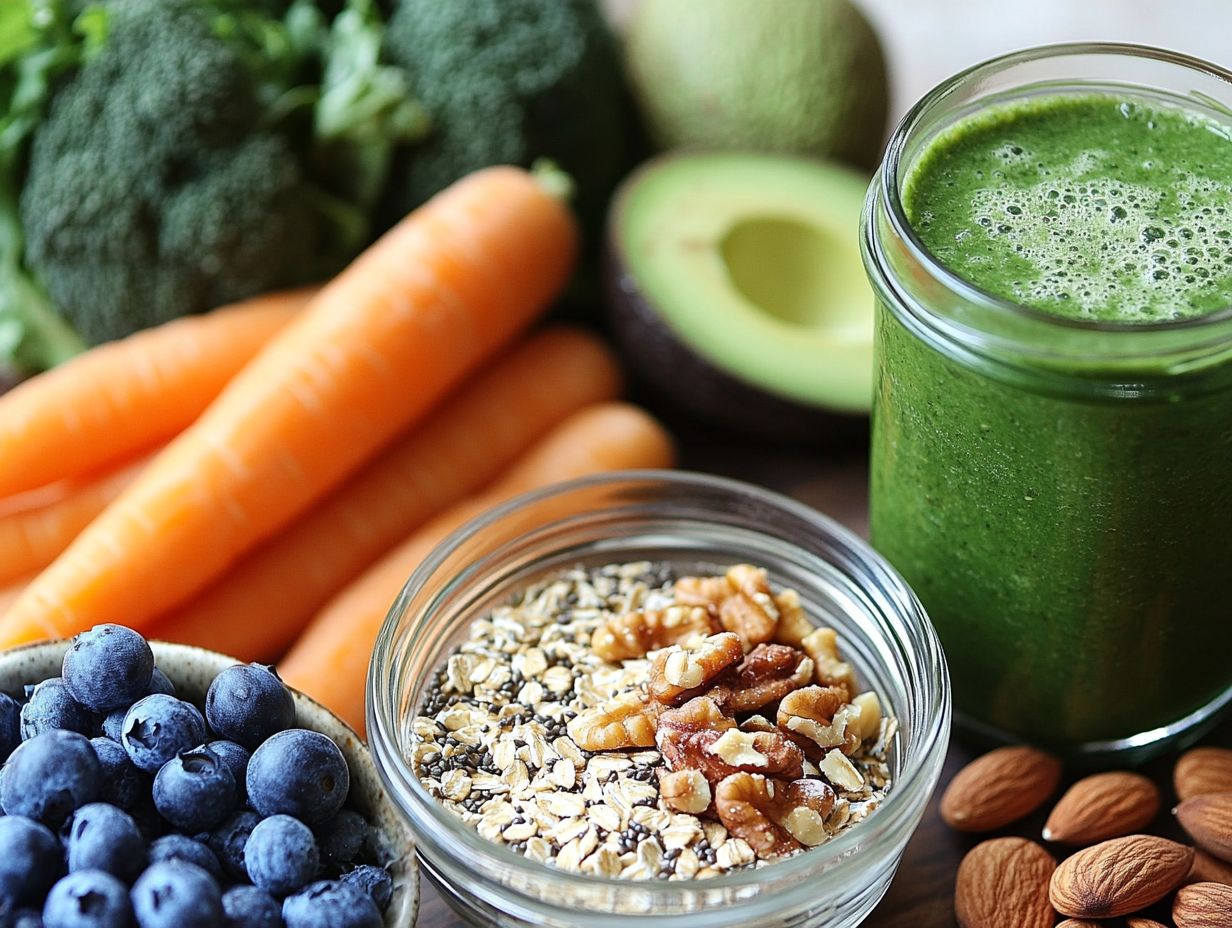
Oatmeal-based products possess soothing properties, making them some of the best natural remedies for eczema. Colloidal oatmeal helps reduce itching and irritation, naturally alleviating inflamed skin and maintaining moisture.
Additionally, oatmeal contains numerous beneficial components that aid in repairing the skin barrier, which is often compromised in individuals with eczema. Creams, lotions, and bath additives containing oatmeal are excellent options for eczema sufferers, offering the flexibility to choose products that best fit their routine.
The benefits of these products are maximized when applied immediately after bathing, as this helps to absorb moisture. Formulations that include other beneficial ingredients, such as shea butter or hyaluronic acid, can provide added hydration.
Regular use of oatmeal-containing products can lead to visible improvements and a reduction in the frequency and severity of flare-ups.
2. Natural Oils
Natural oils such as jojoba oil and sunflower oil are effective in treating eczema due to their moisturizing properties and ability to enhance the skin barrier. These oils help lock in moisture and provide essential nutrients that alleviate symptoms associated with eczema, such as dry and irritated skin. They can be easily incorporated into a daily skincare routine.
For instance, tea tree oil possesses anti-inflammatory properties that can soothe itching, while coconut oil acts as a natural antibacterial agent, helping to protect sensitive skin from infection. For optimal absorption, these oils should be applied after a shower when the skin is still damp.
Additionally, a combination of sweet almond oil and calendula oil can deliver deep hydration and healing for eczema-prone skin. By including these oils in their daily hydration regimens, patients can maintain healthy skin and help limit flare-ups.
3. Non-irritating Cleansers
Using non-irritating cleansers is essential for maintaining healthy skin in individuals with eczema, as harsh cleansers can exacerbate dryness and irritation. Gentle, fragrance-free cleansers are the best options for cleansing sensitive skin without stripping it of its natural moisture.
The ideal cleansers for eczema-prone skin contain non-irritating ingredients such as colloidal oatmeal, which helps reduce inflammation, and ceramides, which restore the skin’s natural barrier. Brands like Cetaphil and Vanicream offer cleansers specifically designed for eczema-prone skin, providing a gentle wash that minimizes the risk of flare-ups.
Additionally, using cleansers with minimal preservatives can further decrease the chances of a reaction. By incorporating these gentle cleansers into a daily skincare routine, individuals with eczema can experience a significant improvement, resulting in increased comfort and a healthier skin barrier over time. Therefore, making informed choices about cleansers is crucial for people with eczema.
How Can a Vegan Diet Help with Overall Skin Health?
A vegan diet can significantly enhance overall skin health by supplying a diverse array of nutrients that support both the function and appearance of the skin.
The anti-inflammatory properties and antioxidants found in many plant-based foods can address various skin issues beyond eczema, while also promoting skin hydration and a radiant complexion.
1. Anti-inflammatory Properties
A vegan diet has been shown to possess anti-inflammatory properties that can significantly benefit skin health, particularly for individuals with conditions such as eczema.
Foods rich in omega-3 fatty acids, like chia seeds and flaxseeds, are especially helpful as they reduce inflammation and promote a more even skin tone, beneficial for those experiencing inflammatory skin conditions such as eczema and atopic dermatitis.
Vegetables and fruits are also essential components of a vegan diet, as they are packed with antioxidants that help prevent oxidative stress, which can damage the skin and lead to various issues.
Berries, particularly blueberries and strawberries, are high in vitamin C, a nutrient vital for collagen synthesis and skin repair, and an important part of a Mediterranean diet known for its anti-inflammatory properties.
Leafy greens, such as spinach and kale, are abundant in nutrients that help reduce inflammation and contain water, which supports skin elasticity.
Additionally, turmeric and ginger, common ingredients in many vegan and Ayurvedic diet recipes, contain curcumin and gingerol, known for their anti-inflammatory properties, making them beneficial for soothing irritated skin.
2. Increased Intake of Antioxidants
A vegan diet is rich in antioxidants, which are believed to promote overall skin health by protecting against oxidative stress and environmental factors that can lead to premature aging. Consuming a variety of fruits and vegetables supports skin health through natural repair mechanisms and may help control common conditions like chronic eczema and linked conditions such as fibromyalgia.
Fruits:
- Berries
- Citrus fruits
- Pomegranates
These are high in vitamin C and polyphenols, which can help rejuvenate and brighten the skin while reducing the appearance of fine lines and wrinkles.
Leafy Greens:
- Spinach
- Kale
These are rich in vitamins A and E, both of which are essential for maintaining skin elasticity and hydration.
Vegetables:
- Carrots
- Sweet potatoes
These are abundant in beta-carotene, which may help improve skin tone and impart a youthful glow.
The combined effects of these antioxidants can enhance the skin’s barrier function, providing protection against sun exposure and pollution.
3. Improved Gut Health
Another significant benefit of a vegan diet is improved gut health. A strong immune system and good gut health have been shown to alleviate skin conditions such as eczema.
A vegan diet is rich in fiber, and when combined with fermented foods containing probiotics, it promotes a healthy gut microbiome, which is essential for overall skin health.
